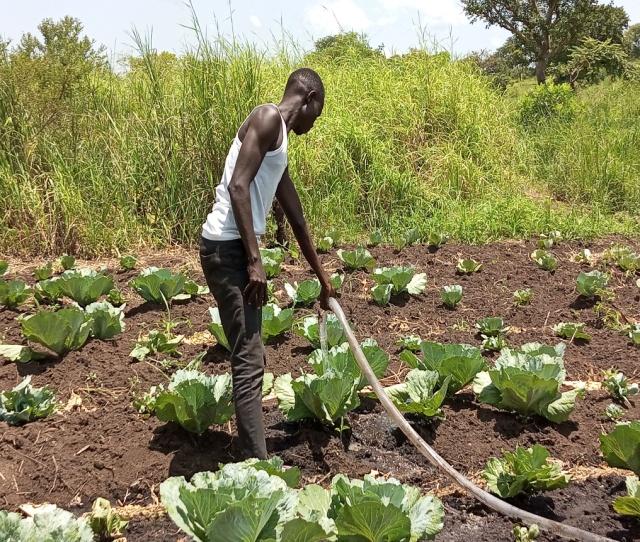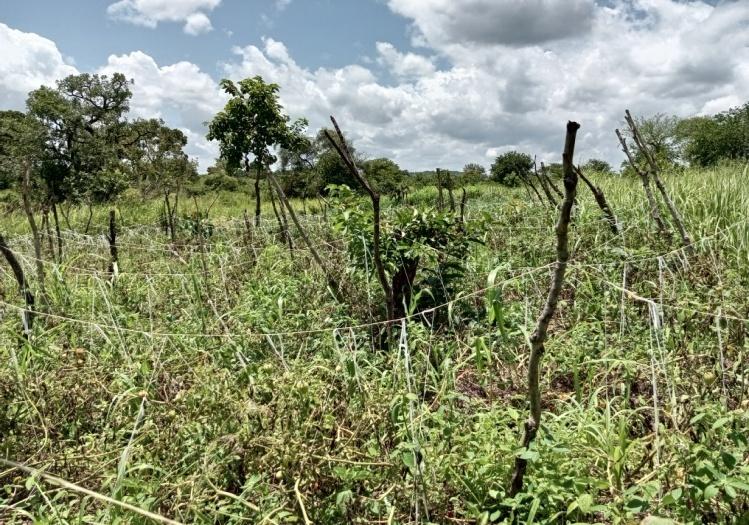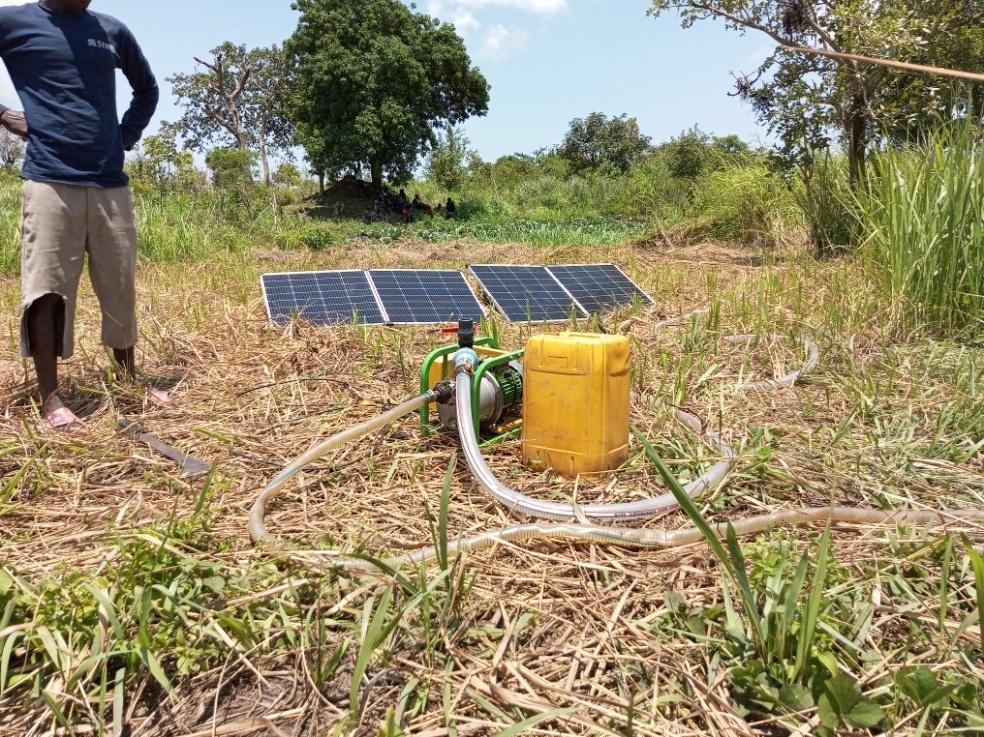Adjumani, (UG):- The adoption of solar-powered technologies such as solar dryers and cold storage units creates opportunities for economic empowerment across the value chains from farmers to traders. However, for these to be widely adopted, the development of technical local expertise, access to affordable financing solutions and enabling policies is required.
The Atetapkwe Itego Youth Group in Maaji I Refugee Settlement, Ukusijoni Sub County Adjumani District Chairman, Mr Alumai Michael, said that they started this group in 2021 with 10 members( 4 refugees and 6 nationals ) although later people started joining them after seeing the importance of the group that has now added to 21.
“In our first harvest which was planted on half an acre of Tomatoes we have earned over shs3 million,” says Alumai. “The first pump we bought was not helping us as expected to run the whole garden till a friend advised us to get help from Sun culture and after acquiring it, it boasted our farming,” he adds.
According to Alumai, they bought the solar at 1, 656,000/= at 60% for refugees and 50% for host communities. This is so because of the subsidy paid by Ayuda en Accion to boost agriculture in the camps.
Mr. Alumai lamented that, much as they are active on their farm they face several challenges which range from, lack of transport to taking their harvests to the market, pests and diseases which attack the vegetables, and few people to take part in the farming, competition for market due to other traders from the central and other places.
Much as challenges are there, it has made them pay for their children at school both in primary and secondary schools and this has improved their standards of living.
“I request all those NGOs dealing in agriculture-related activities should extend their hands towards their group to boast them,” Alumai says. “Engaging us the refugees and the hosts in the proper utilization of the solar pump will enhance our livelihood and reduce on the biting poverty in our communities.”

It is common knowledge that in the camps, the refugees struggle because of a shortage of food and money to feed and educate their children. However, due to the support given by Ayuda en Accion through the Sun culture by providing solar panels and water pumps to boost agriculture, many lives have changed livelihoods have become better.
Mr. Kanadaruku Stephen, a Sub Culture beneficiary from Pachara Sub County while giving his testimony said that when he started tomato farming three years ago he used to make losses because of the change in rain patterns. However, this has since changed after buying the solar panel from Sun Culture because he is now reaping big.
“I have earned millions out of the money I got from selling of the green vegetables all these because of the solar I have bought”, says Kanadaruku.
Mr. Kanadaruku also added that out of the money he got, he started a piggery project where he bought 10 piglets and 10 goats in February 2024 to which in a few months to come will boost his farming and raise his standard of living. He said he used to produce only for home consumption but after buying the solar panel he is now engaged in commercial farming.
“I thanked Ayuda en Accion for the support they have given me and other smallholder farmers in Adjumani District because of the subsidy of 40% of the price of the solar panel and I want to buy another solar bigger than what I have now because i want to open more piece of land,” says Kanadaruku
Mr Anyama Richard, a beneficiary of Tulima Solar, one of the partners working hand in hand with Ayuda en Accion, also said he got to know about Tulima Solar through his friend and after acquiring the solar in 2023, he opened a tomato garden of which he reaped big out of it and managed to buy one heifer for himself and this year he is planning to get a bigger solar that can cover a wider area.
Mrs Aziku Kevin, a beneficiary of Ebenezer Solar Energy, also narrates that when she got information about this company, she acquired one single-burner cooking stove which uses volcanic rock aided by charcoal dust and connected to the solar system. According to her, this stove can boil water within 5 minutes.
Mrs. Aziku said that before she acquired this stove she used to spend a lot of money on buying charcoal of 30,000/= a month but after this, she is now spending 10,000 a month each basin of the charcoal dust cost 2,000/= from the local market. According to Aziku, this stove is also time-saving, cost-effective (clean and smart) and can even be used for phone charging, radios etc.
“I thanked Ayuda en Accion for paying half of the money for her which initially cost 600,000/= and would have been too much for me but because of them am now using it,” says Aziku.

According to Laze Dennis, the Adjumani Sales Manager for Sun Culture, the company gives solar panels to support smallholder farmers. Sun culture has so far spread its wings across Africa and in Uganda it’s in Adjumani, Arua, Gulu, and Soroti among others
Laze also says that solar energy is environmentally friendly and that since the establishment of the office in Adjumani they have given out 28 solar panels both on cash and credit that is 21 went on credit and 7 on cash. These are given on credit because most farmers have low incomes.
He thanked Ayuda en Accion for the subsidy they have with them which makes it easier for smallholder farmers to acquire these solar panels and said that the uptake of the solar between the host and refugees is the low number of refugees in the past but after the 60% subsidy given by the organization to refugees it has gone high in the past two months. Much as they are reaping big, they face challenges from similar companies in the market and other pumps that use fuel which are much cheaper.
Mr. Okello Rodrick, the Adjumani Sales Manager – Tulima solar, which gives solar panels to small holders farmers to boast their farming activities. Tulima solar operates in Lamwo, Obongi and Adjumani, their solar panels costs 900,000/= for host communities and 720,000/= for the refugees. However, according to Okello, if one goes outside the three areas of operation or project areas, one will buy the panels at 1,800,000/=, but because of the 60% subsidy given by Ayuda en Accion to the refugees and 50% to the host community it becomes much cheaper for the farmers to have it.
According to Okello, one can pay it in installments of which the first payment will be 400,000/= and the balance of 500,000/= in six months to complete it and will come at an interest rate which will amount all together to 970,000/= for host communities.
Okello lamented that the most challenging part of the business is the mindset of the people, most of them think that solar should be given for free for them of which affects their business, he however said that the 900,000/= they paid is inclusive of transport, installation and two years of after sales service. He said that they have already given out 135 solar panels to the three districts, Lamwo 18, Adjumani 7 and Obongi takes the largest share of 110 solar panels
“I request the government to come into place to support the input dealers by reducing on the prices of the solar panels and also taxes so that the smallholder farmers dealing in vegetables and other types of farming that solar pumps can support can acquire and do farming that can uplift their standard of living hence poverty is reduced as stipulated in the SGD of the country”, says Okello
The Adjumani District, Deputy Resident District Commissioner, Mr. Okware Emmanuel, said that Ayuda en accion bringing on board the idea of solar energy to boast farming will empower the small holder’s farmers and the livelihood will also be made better.
“Our environment needs to be safeguarded so the use of solar energy is the best solution to this,” he says.
Mr. Okware directed those who are new in the market more especially in Adjumani to bring on board the indigenous to fight language barriers to ease their work. Ayuda en Accion has partnered with Sun culture, Tulima Solar and Ebenezer Cooking Stove to help farmers and others to save the environment.
Mr. Okello David, the Regional Manager – Ayuda en Accion who oversees Adjumani Lamwo and Obongi says they have two projects productive use of renewable energy of solar pump and clean cooking which is majorly saving our environment. They also support four Primary Schools in the host communities by giving scholastic materials to about 820 pupils.
“We have 50 beneficiaries for the solar pump of which 47 are from Sun Culture and 3 are from Tulima Solar,” Okello reveals.
The adoption of solar drying and cold room technologies presents a significant opportunity to enhance agricultural productivity while increasing revenues for farmers and traders in Adjumani, Obongi, and Lamwo. Solar drying will directly benefit cassava farmers across all three districts, especially in Lamwo where the highest production of cassava was confirmed. Solar drying will reduce post-harvest losses by 20% and increase revenues by 25% at a solar drying cost of only 9% of revenues per harvest.
Cooling technologies such as cold rooms and single fridges primarily benefit traders through reducing post-harvest losses for fresh fish. A cold room is beneficial to tomato traders in Adjumani and Obongi. The cold room will reduce post-harvest losses by 30% and increase revenues by 39% at a cold room service cost of 13.6% of revenues per week. Successful implementation, however, requires a collaborative approach with strategic planning, capacity building, and careful financial considerations to ensure economies of scale are leveraged.
Partnerships with PURE technology providers and financial institutions are required and must entail: awareness campaigns, training programs, and engaging policy makers to develop favorable policies. Developing a pilot that is collaborative and educational will lead to success in the promotion and uptake of PURE technologies.
While solar drying and cooling technologies have high upfront costs, innovative financing models and favourable tax incentives make them more affordable for end users, which is the case for solar cooling technologies. Therefore, a multi-faceted approach involving various stakeholders can ensure the successful rollout of PURE technologies, leading to sustainable agricultural practices and improved livelihoods for farmers and traders in Northern Uganda.
Do you have a story or an opinion to share? Email us on: [email protected] Or join the Daily Express WhatsApp channel for all the latest news and trends or join the Telegram Channel for the latest updates.

